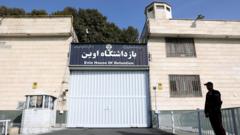President Trump announced a proposed cease-fire between Israel and Iran, stating on social media that both nations agreed to a halt in hostilities. However, Iran's foreign minister quickly countered this, asserting no agreement was currently in place. As tensions mount following missile exchanges and U.S. strikes on Iranian nuclear sites, the potential for escalation remains high.
Tensions Simmer as Trump Claims Cease-Fire, Iran Denies Agreement

Tensions Simmer as Trump Claims Cease-Fire, Iran Denies Agreement
Amid ongoing hostilities between Iran and Israel, President Trump asserts a cease-fire has been reached, but Iran's foreign minister refutes the claim, leaving the situation uncertain.
---
June 24, 2025 - In a surprising turn of events, President Trump took to social media to declare that a cease-fire agreement had been reached between Israel and Iran following a series of missile exchanges and recent U.S. airstrikes on Iranian nuclear facilities. His announcement came just hours after Iran launched missiles targeting Al Udeid Air Base in Qatar, the largest U.S. military installation in the Middle East, where approximately 10,000 U.S. troops are based.
However, Iran's Foreign Minister Abbas Araghchi responded swiftly, denying the existence of a cease-fire and emphasizing a condition: if Israel ends its attacks against Iran by 4 a.m. Tehran time, Iran would likewise cease its military responses. Meanwhile, Israeli forces escalated their operations, conducting strikes against Iranian targets, raising doubts about Trump's claims.
Despite the conflicting narratives, the Trump administration claims diplomatic efforts, facilitated by Qatari officials, were underway to reach an agreement after a week of intense clashes. Three diplomats, who spoke on condition of anonymity, indicated that Qatar had played a significant role in negotiating a cease-fire proposal, suggesting that it was contingent on specific military conditions being met by both parties.
In a somewhat optimistic tone, Vice President JD Vance stated that an opportunity existed to "restart a real peace process" after asserting the war was “effectively over.” However, uncertainty looms as Israeli military responses continue, with airstrike campaigns reported in Tehran, prompting widespread concern over regional escalation.
The ongoing conflict has not only heightened military tensions but also significantly impacted global economic markets, with oil prices dropping following reports of retaliatory missile launches. The European Union's chief diplomat expressed alarm over the potential for further escalation, emphasizing the need for renewed dialogue to prevent the situation from spiraling out of control.
The outcome of these high-stakes exchanges remains unclear, as both sides continue to posture militarily while diplomatic avenues are explored. The international community watches closely, worried that without productive dialogue, the conflict could lead to broader regional instability.
June 24, 2025 - In a surprising turn of events, President Trump took to social media to declare that a cease-fire agreement had been reached between Israel and Iran following a series of missile exchanges and recent U.S. airstrikes on Iranian nuclear facilities. His announcement came just hours after Iran launched missiles targeting Al Udeid Air Base in Qatar, the largest U.S. military installation in the Middle East, where approximately 10,000 U.S. troops are based.
However, Iran's Foreign Minister Abbas Araghchi responded swiftly, denying the existence of a cease-fire and emphasizing a condition: if Israel ends its attacks against Iran by 4 a.m. Tehran time, Iran would likewise cease its military responses. Meanwhile, Israeli forces escalated their operations, conducting strikes against Iranian targets, raising doubts about Trump's claims.
Despite the conflicting narratives, the Trump administration claims diplomatic efforts, facilitated by Qatari officials, were underway to reach an agreement after a week of intense clashes. Three diplomats, who spoke on condition of anonymity, indicated that Qatar had played a significant role in negotiating a cease-fire proposal, suggesting that it was contingent on specific military conditions being met by both parties.
In a somewhat optimistic tone, Vice President JD Vance stated that an opportunity existed to "restart a real peace process" after asserting the war was “effectively over.” However, uncertainty looms as Israeli military responses continue, with airstrike campaigns reported in Tehran, prompting widespread concern over regional escalation.
The ongoing conflict has not only heightened military tensions but also significantly impacted global economic markets, with oil prices dropping following reports of retaliatory missile launches. The European Union's chief diplomat expressed alarm over the potential for further escalation, emphasizing the need for renewed dialogue to prevent the situation from spiraling out of control.
The outcome of these high-stakes exchanges remains unclear, as both sides continue to posture militarily while diplomatic avenues are explored. The international community watches closely, worried that without productive dialogue, the conflict could lead to broader regional instability.





















